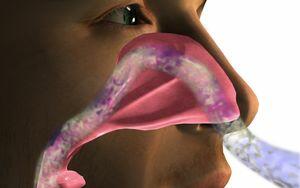Breathing is something we do naturally, usually without much thought. While you may breathe through your nose, some people use their mouths instead. Mouth breathing can occur occasionally, such as when you have a cold and your nose is stuffed up, or during sleep. However, when you breathe through your mouth all the time, it can lead to both oral health and overall health issues. Here’s why you should breathe through your nose instead.
Why Nasal Breathing Is Important
Nasal breathing is the natural way our bodies are intended to breathe. We are meant to keep our mouths closed, and breathe through our noses, as the nose is our body’s filter. As you breathe through your nose, it helps prevent harmful particles and germs from entering the lungs. As well, when air enters the nose it is humidified keeping it at the ideal temperature to enter the lungs. This is important, as proper temperature is required to inhale oxygen. The nose also produces nitric oxide which we need for heart and blood vessel health.
Why Mouth Breathing Is Bad
Mouth breathing, even at night, can lead to many health challenges. When you breathe through the mouth, you dry out your mouth, gums, tongue, and oral cavity. Dry mouth allows excess acids to build and remain in the mouth which can lead to poor oral health, tooth decay and gum disease. Your saliva plays an important role as it keeps your mouth moist so you can wash away acids and bacteria throughout the day. You can also collect more debris when chewing food and swallowing it, so it does not stay in the mouth. However, it goes beyond just oral health. Other potential issues include:
- TMJ: When you breathe through the mouth it drops the tongue and affects the posture of the jaw, which juts down and out. This can cause jaw strain and painful TMJ issues including headaches, muscle pain, facial pain and issues with chewing and bite.
- Long Face: Because mouth breathing affects jaw position, it can cause developmental issues in children. The constant position that forces the mandible down and out encourages the face to grow long instead of round. This leads to a long, skinny appearance which constricts the nasal passages as well as the back of the throat, causing breathing disorders.
- Throat Issues: Children who are mouth breathers can develop issues including allergies, long faces, and obstructions in their nasal passages. As a result, their development can change too. This includes a higher risk for painful and dangerous illnesses such as strep throat or enlarged tonsils and adenoids.

- Orthodontic Issues: As with above, when you do not breathe through your nose, your tongue and jaw are not in the ideal position. This can lead to issues when teeth emerge, so orthodontic treatment is required to correct teeth positioning or bite issues.
- Nitric Oxide Deficiency: Mouth breathing can create a nitric oxide deficiency. As a result, your body adapts to the deficiency and eventually this can lead to heart disease. It is believed healthy people who suffer from heart attacks in their 40’s could be suffering from a lack of nitric oxide due to years of mouth breathing.
- Snoring and Sleep Apnea: When you breathe through your mouth you are more likely to snore, or develop sleep apnea. This is because your tongue is not in the ideal position for proper breathing when lying down. Both issues can interfere with sleep which in turn can interfere with overall health. Sleep apnea, heart disease and diabetes are all associated with mouth breathing.
- Insufficient Oxygen: Proper breathing regulates how much oxygen comes into the nose and is taken into the body. Mouth breathing can interfere with regulation, so the body does not get the right amount of oxygen it needs.
- Insufficient pH Levels: Mouth breathing can lead to a change to the pH level in blood, which then becomes more acidic. This can increase the risk of cancer cell growth.
These are just a few examples of complications caused by mouth breathing. General dentistry checkups can keep an eye on signs of mouth breathing so you can catch the issue early on. As part of preventative dentistry treatments, your dentist can also identify the need for orthodontic treatments.
Mouth Breathing Under Our Masks
The pandemic has made it necessary to wear masks. However, what people might not realize is that when wearing their masks they are not breathing properly. As mentioned, breathing through your nose is the healthiest way to breathe. When it comes to illnesses such as COVID-19, nose breathing is our first line of defense as it prevents unwanted particles from entering into the lungs. When wearing your mask, therefore, you should remember to breathe through your nose. Inhale through your nose and exhale through your nose as well. If you begin mouth breathing under your mask, you are deactivating your best first defense against infection from COVID-19.
Learning To Breathe Through Your Nose
If you feel you, or your child, are mouth breathing, you can retrain yourselves to breathe through your nose with these tips:
- Practice: Whenever you can, make sure your mouth is closed and practice inhaling and exhaling through your nose. This should be done as often as possible to help retrain yourself to breathe through your nose properly.
- Keep Nasal Passages Clean: Because mouth breathing happens when nasal passages are blocked, keeping nasal passages clean is important. Using saline solutions as a natural remedy to relieve sinus congestion is the safest way to allow yourself to naturally breathe through your nose. This is especially important if you suffer from allergies or have a cold or flu.
- Kids: Children should be taught to breathe through their nose as early as possible. If you notice your child is breathing through their mouth, practice proper breathing exercises with them to help them form healthy breathing habits.
- Speak to Your Dentist: Your dentist can examine your child for signs they are mouth breathing. If you are a mouth breather, there are devices available to assist in proper breathing. For example, night mouth breathing can be treated with a mandibular advancement device that assists in opening your airways. You might also require oral myofunctional therapy. This teaches the brain to refocus on proper breathing using exercises such as closing the mouth and lips and practicing breathing through the nose.
Whether you are wearing a mask, or safe at home, remaining vigilant to breathe through your nose will help keep you healthier and calmer.
For a professional opinion on whether you may need dental intervention for mouth breathing, call today at 905-775-5307 or click here to request an appointment.


